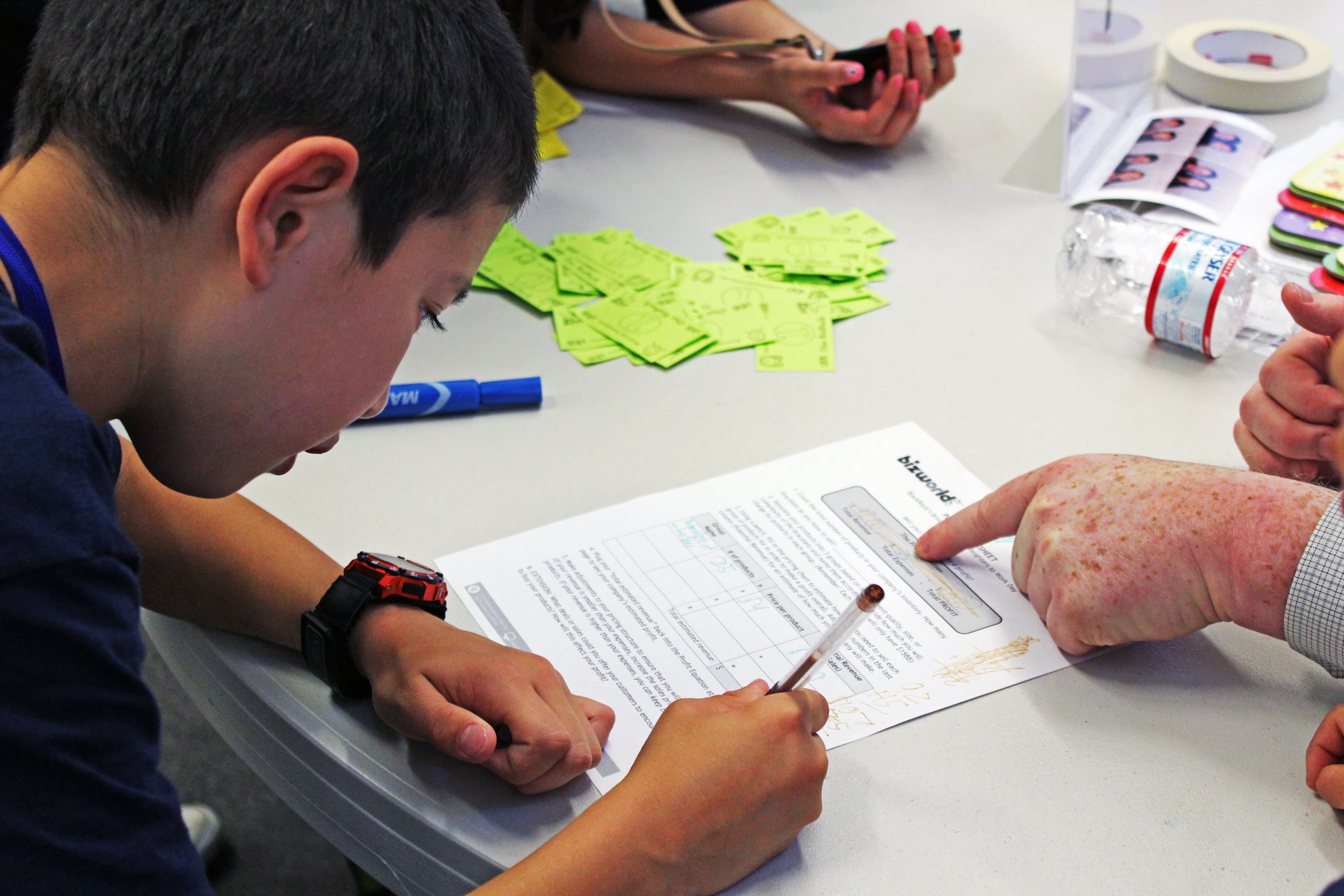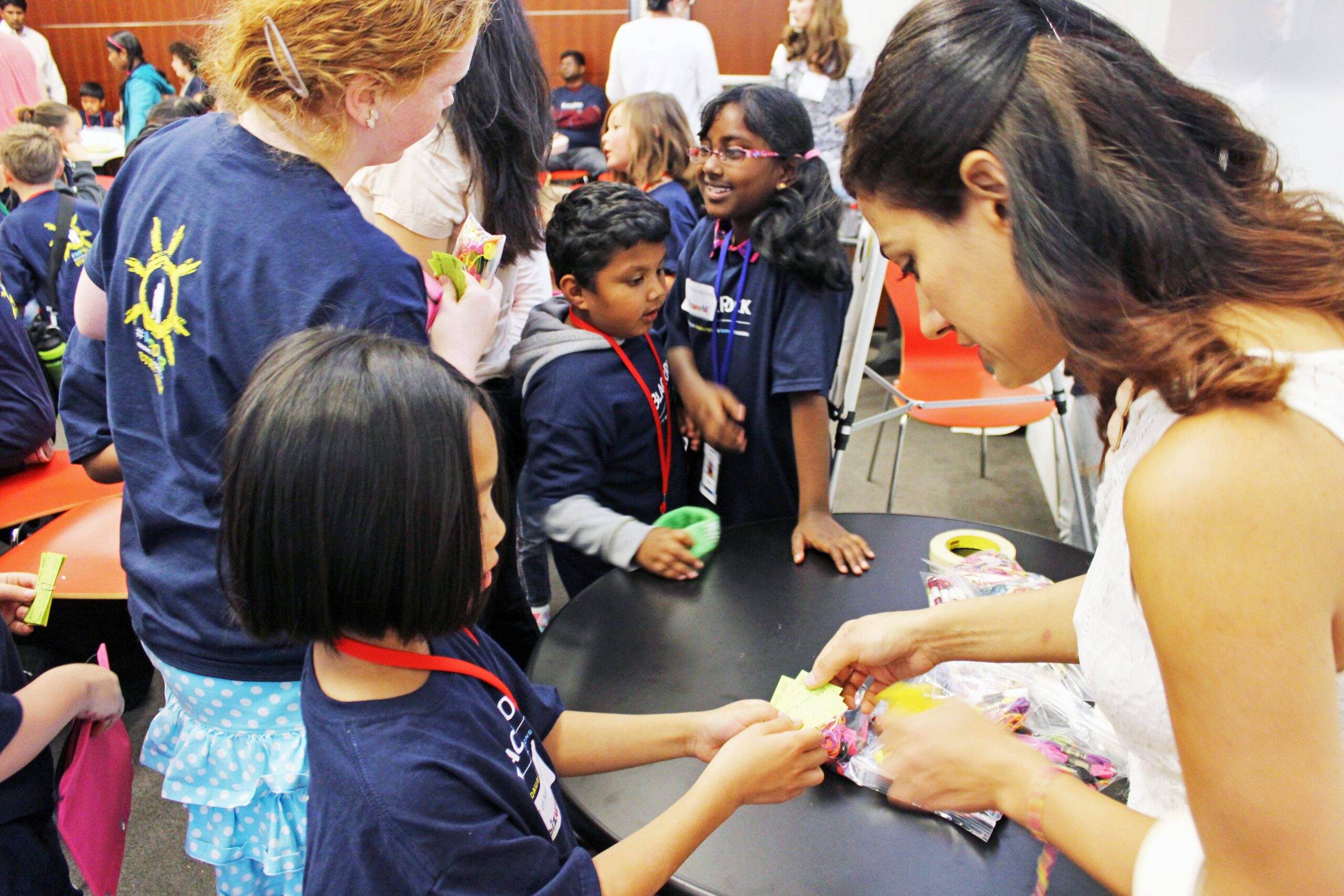1) Q: Do you believe that entrepreneurship and financial education are important skills to learn at a young age? If so, why?
Absolutely. Instilling any values in children at a young age is incredibly important as it molds how their minds develop. These values guide them on how they think, analyze, make decisions and act. As adults who influence these young minds, we must choose our actions and counsel around our children wisely. As we relate that to financial education and entrepreneurship, we are really looking at two questions.
Financial Education: Our economy driven in part by consumer spending. Children seeing advertisements tell them and adults to buy the “next big thing we must have” while the last big thing we just needed sits unused, or worse, in the trash. Teaching young children the value of money and “stuff” is critical to developing a healthy relationship with money as they grow. One of U.S. Bank’s recent magazine articles, “Jump Start Your Teens Financial Future,” notes that setting and achieving goals can be a powerful way to teach young people about wealth management.
Some sad news, according to a Financial Industry Regulatory Authority (FINRA) Investor Education Foundation’s 2013 study, “Financial Capability in the United States,” measures of financial capability are markedly low among 18- to 34-year-old Americans. These young adults are more likely than adults over 35-years old to declare bankruptcy, withdraw money prematurely from retirement accounts, overdraw checking accounts, and use costly credit card borrowing methods and struggle with the management of short-term unexpected expenses. Understanding and respecting the relationship with money, along with goal setting is a good foundation to healthy money management. As most of adults know, this is a solid lesson to learn and the earlier the better.
On entrepreneurship. Understanding the power of entrepreneurship goes beyond monetary benefits. It teaches a most important lesson: if you really want something and work hard for it, you can achieve it. Even if the actual “it” outcome may not look exactly as one imagined. “It” may be a lot better! Entrepreneurship teaches us to dream. It provides hands-on experience in risk/reward, hard work, luck and failure and the gift of constant learning. Entrepreneurship is empowerment and how important is that lesson? How many of us adults wish we would have learned about entrepreneurship when we were young?
2) Q: With more and more states incorporating financial literacy into their required standards, we are learning the importance of teaching students the foundations of financial responsibility at a young age. What are some activities you would recommend for our teachers to use in their classrooms?
Parents and teachers can use the same strategies. TALK to kids about your own goals and spend time together as a family and as a classroom making choices.
Schools and teachers can partner with organizations such as BizWorld.org and U.S. Bank on engaging students with entrepreneurship education programs. The key for kids is to make it tangible and fun.
BizWorld.org is an organization of students, parents, educators, and volunteers dedicated to improving education in the world. BizWorld.org’s project-based entrepreneurial programs provide students and teachers with authentic learning experiences in which students actively participate in investigating real-world concepts like problem-solving, managing finances, working in teams and being leaders. The programs equip students with the skills to explore career possibilities or create their own employment opportunities.
At U.S. Bank, we believe that financial education is essential in building healthy financial habits for life. During the 2013-2014 school year, more than 4,000 high school students participated in the U.S. Bank Financial Genius Scholars Program, of which 2,200 were certified by completing all of the available learning modules. Since the program’s inception in 2010, more than 10,000 students have participated.
In fact, U.S. Bank is celebrating Financial Literacy Month this April through its Financial Genius Scholars Program. Throughout the month, U.S. Bank volunteers are connecting with high school students in eight cities: Sacramento, San Diego, Duluth, San Francisco, Rapid City, Phoenix, Seattle and St. Paul. These volunteers are engaging students in a variety of activities including classroom discussions, online games and financial literacy lessons. Students are also taking part in Q and A sessions with our bankers, who provide insights into careers in the financial services industry and address personal finance questions.
In addition, students can take online courses through the U.S. Bank Financial Genius Scholars Program, which provides real-world scenarios and knowledge to sharpen personal finance skills. Topics Include: Savings & Budgeting, Understanding a Credit Score and its Implications, Understanding Credit Cards & Managing Debt, How a Bank Works & Federal Reserve overview, Taxes and Insurance, Renting vs. Owning, Managing Loans to Finance a Higher Education, Investing Overview and Consumer Fraud and Protection.
Just a few examples of programs teachers and parents can take advantage of!

3) Q: What can parents do to encourage good savings and investing habits in their children?
1. Lead by example and talk to them.
I used to hate it when my parents told me “we can’t afford it…” I heard that a lot in my life and I can tell you I made some bad money decisions early in life as a result of wanting to get away from this mentality! Parents should explain to, and not just tell, children why you and/or they just might not really need that “next big thing we must have”. Show children the value (and freedom!) of life without excess stuff. Explain the work: stuff ratio and what is really important. It’s generally not “stuff”.
2. Parents should set “S” Goals as it relates to money: Share, Save, Spend.
Parents should set appropriate goals for children on spending, giving money through philanthropy, and saving money. Parents should begin having conversations about money — around goals, needs and wants, and how money works — as soon as their kids are old enough to understand the concept. Honestly, it’s never too early, nor late to start.
4) Q: What are your top 5 suggestions on savings and investment resources that we could share with our educators and parents?
U.S. Bank has some great resources available, including articles available through The Private Client Reserve’s web site, reserve.usbank.com. We also have a program called RealSteps>Retirement that offers great ideas for savings, many of which can be used by families and shared with young adults. We also offer Financial Genius – a really a great tool for parents and young people.
Other great ideas other than websites and books include attending local seminars, consulting with a financial advisor and engaging with your children with games such as Monopoly.
The key with kids – make it fun!

Michele Hanson
Vice President | Business Development Officer
RIA Custody Services | U.S. Bank Institutional Trust & Custody
Michele Hanson serves as business development officer for U.S. Bank Institutional Trust and Custody. In this role Michele is responsible for new business efforts focused on registered investment advisors. Her previous responsibilities include institutional relationships vice president for Tealwood Asset Management, as well as vice president and divisional sales director for Ameriprise Financial Services Asset Management division.

